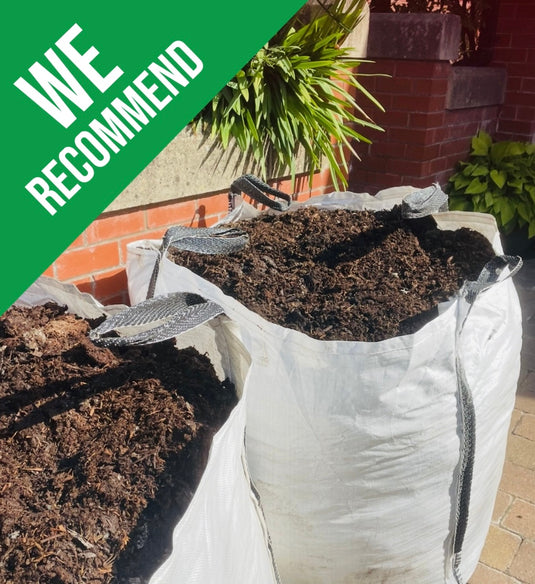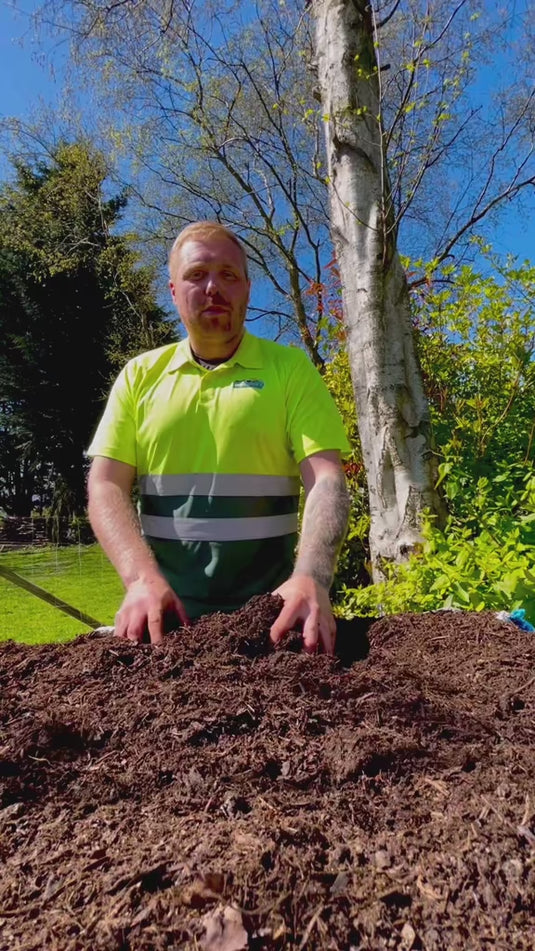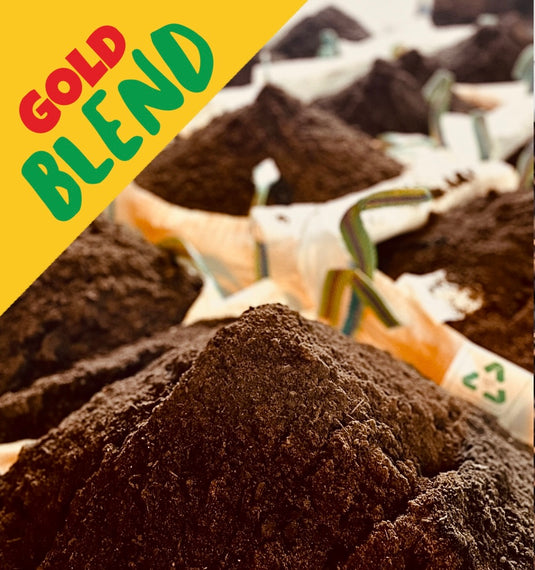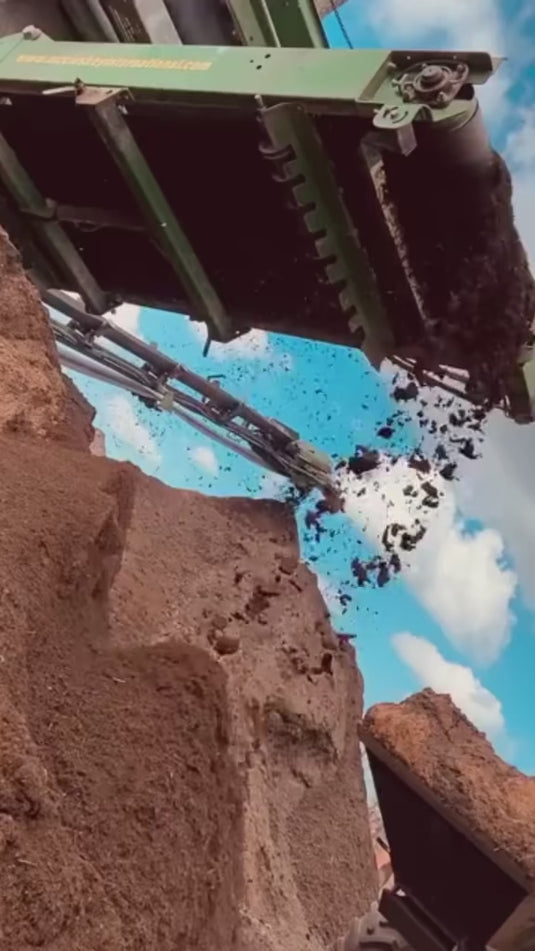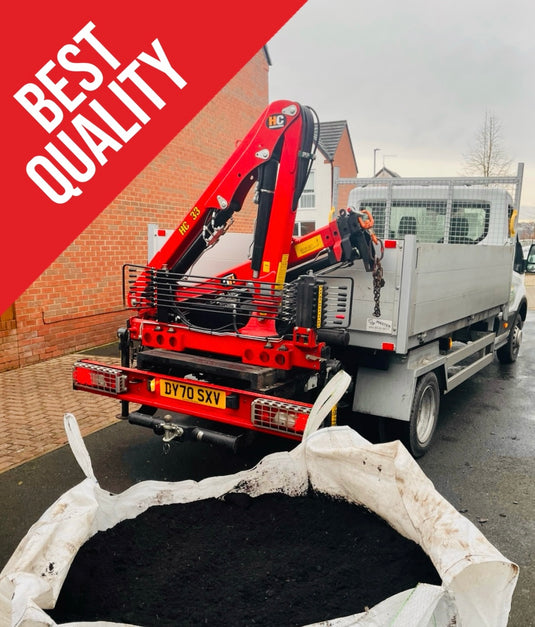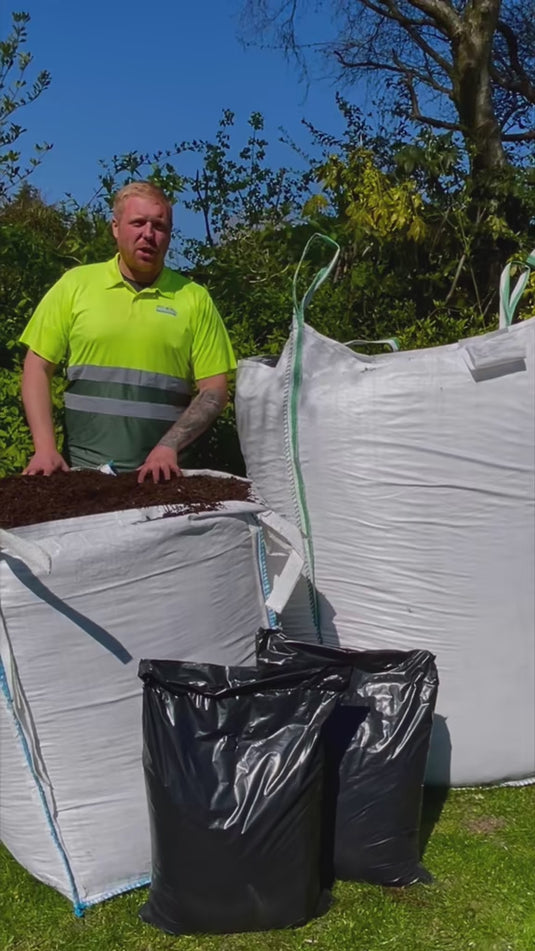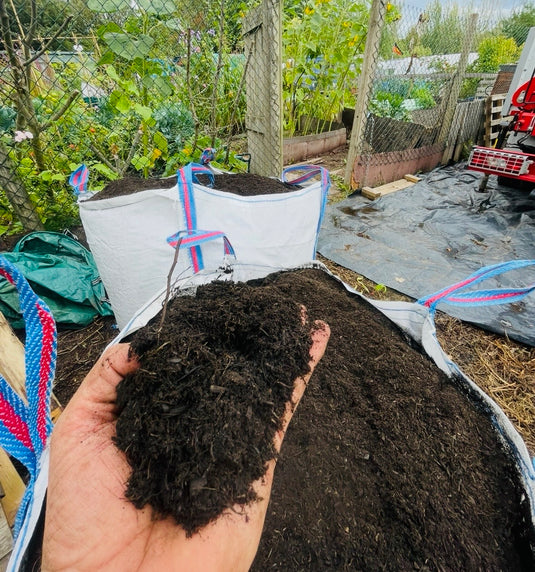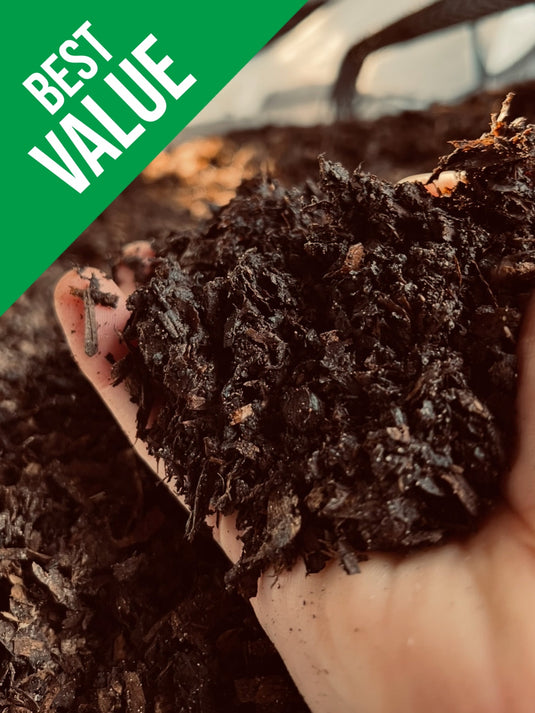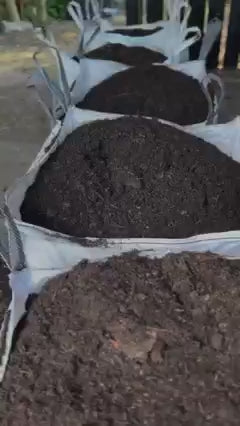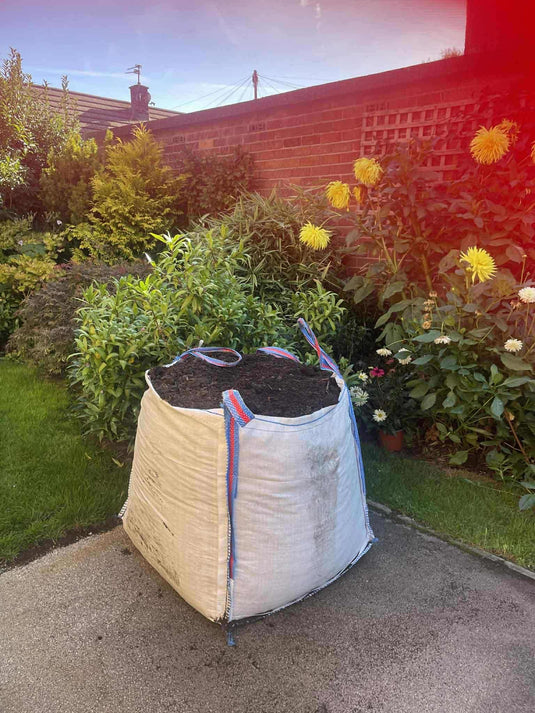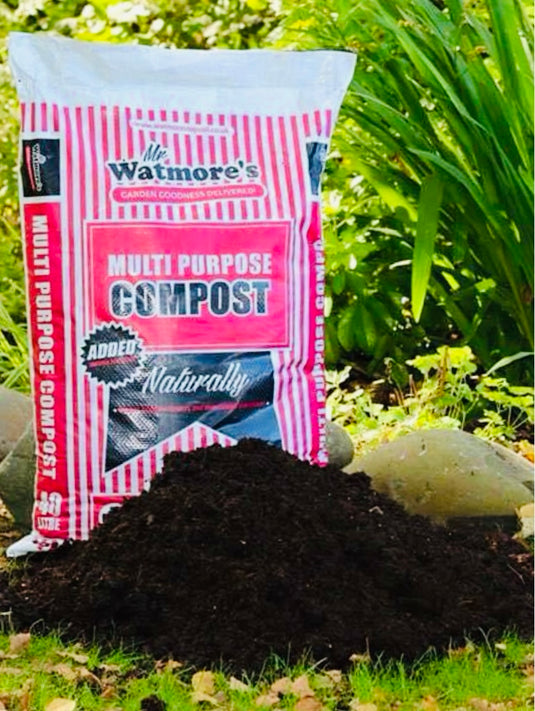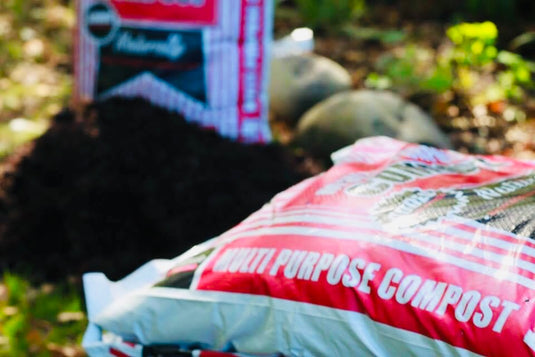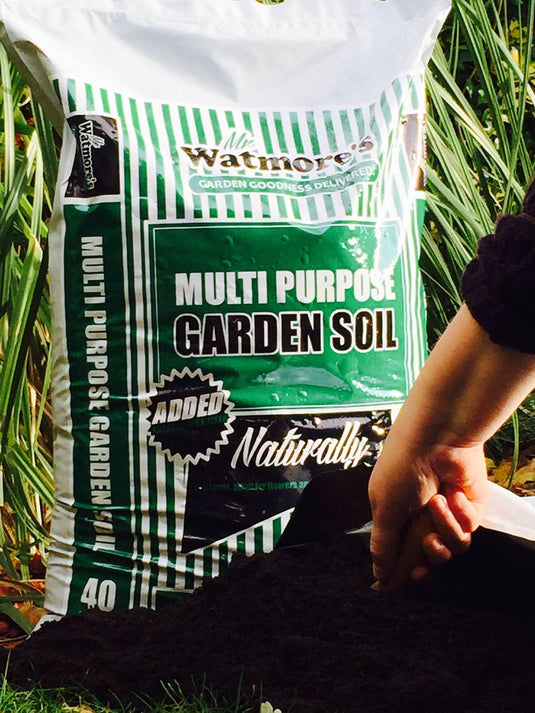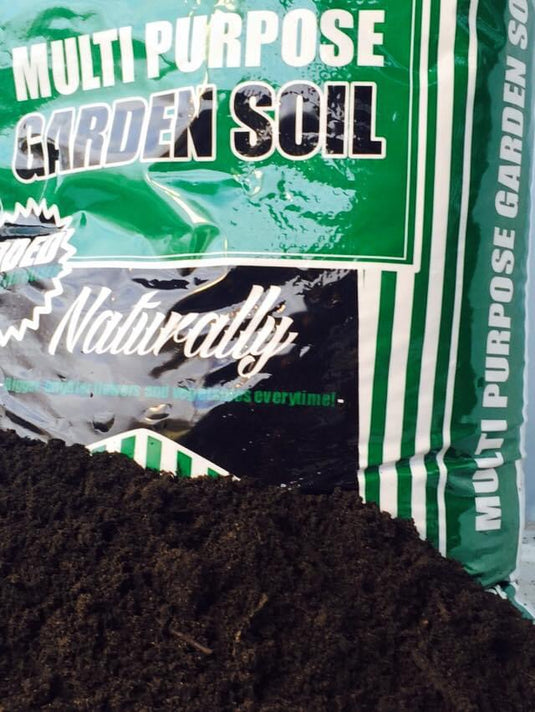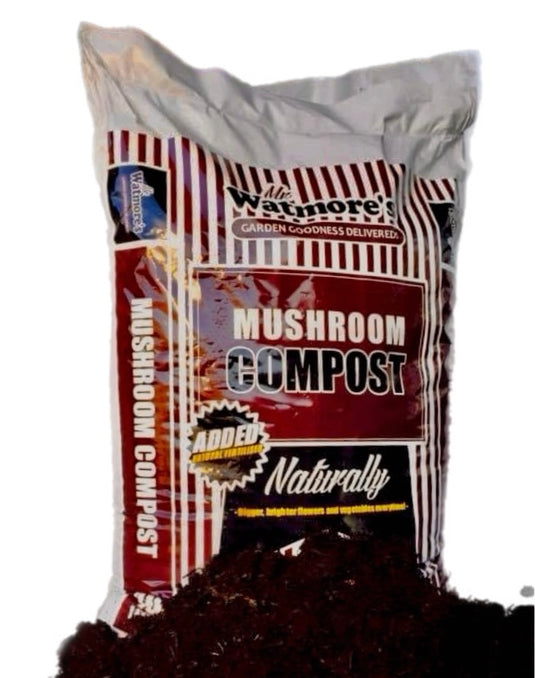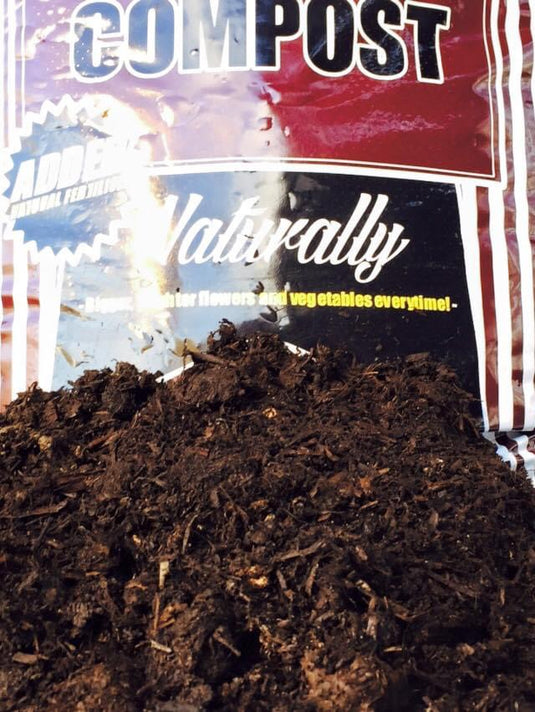Read time: 6 minutes
Do you want to grow a beautiful garden, but don’t know what’s best for the soil? manure and mushroom compost are two popular options for those who are looking to improve their soil quality. We’ll discuss the pros and cons of both manure vs. mushroom compost so you can make an informed decision when deciding which to use in your garden. Both options add nutrients and helpful microorganisms to soil, while also improving texture and water-retention.

Healthy soil is an integral part of having a successful garden. However, soil can be lacking in many areas and may need a boost from a soil improve such as Mr Watmore’s Manure or Mushroom Compost. Luckily both manure and mushroom compost are great for improving long term soil health. Read on to learn more about cow manure vs. mushroom compost and how to use it in your garden.
Why use manure or mushroom compost?
In an ideal world, the soil in our garden would be the perfect texture (not too sandy, not too silty) and teeming with the right balance of nutrients and microorganisms needed to sustain life. We would be able to plant a seed, water it, and watch the tiny seedlings unfurl its leaves. Easy-peasy, right?
Unfortunately, most garden soil is lacking in something. Which is why we turn to soil amendments such as cow manure or mushroom compost to improve garden soil.
Over time as soil is used to support life (the plants and vegetables we grow), it becomes depleted of necessary nutrients and microorganisms. Every so often, it’s important to re-introduce healthy organic matter to soil through manure or compost.
Manure and compost improve soil by adding helpful microbes that break down nutrients into more accessible forms for plants to access.
Luckily, there’s no shortage of manure and compost!
Pros and cons of manure vs. mushroom compost
Here’s a quick look at the pros and cons of these two types of organic fertilizer.
Table: Cow Manure vs. Mushroom Compost at a Glance
| Manure | Mushroom Compost | |
|---|---|---|
| Notes |
Don’t apply fresh manure directly to plants—must allow it to decompose or “mature” first. Watmore’s Farm Manure is composted ready to use screened to <20mm |
Mushroom compost is typically mixed with vermiculite or perlite before using in the garden. Mushroom compost may need to be “matured” for a period to allow for salts to neutralize, particularly around plants sensitive to salts. Check with your supplier. Watmore’s Mushroom Compost is 6-12 months old before screening and packaging |
| Pros | – Improves soil moisture-retention and drainage – Richer source of organic nutrients – Prevents nutrient loss in plants |
– Improves soil moisture-retention and drainage – Rich source of organic nutrients – Easy to use and apply |
| Cons |
– Can’t apply fresh manure—may harm plants always check age and whether it has been composted thoroughly. |
– High salt content may harm salt-sensitive plants -always check it has been heat treated and aged. |
Manure
Notes: Don’t apply fresh manure directly to plants—must allow it to decompose or “mature” first.
Pros of cow manure
- Improves soil moisture-retention and drainage: As a soil amendment, manure is great at improving the structure of soil, making it more hospitable for growing plants.
- Richer source of organic nutrients: manure is a source of many nutrients such as nitrogen, phosphorus, and potassium. In fact, most manures may contain slightly more of these three nutrients than mushroom manure.
- Prevents nutrient loss in plants:Nutrient leaching occurs when vital nutrients are washed away and pushed down in soil where roots can no longer get to them. manure is great at preventing loss of vital nutrients.
Mushroom Compost
Notes: Mushroom compost is typically mixed with vermiculite or perlite before using in the garden. Mushroom compost may need to be “matured” for a period to allow for salts to neutralize, particularly around plants sensitive to salts.
Pros of mushroom compost
- Improves soil moisture-retention and drainage: As a soil amendment, mushroom compost is great at improving the structure of soil, making it more hospitable to growing plants.
- Rich source of organic nutrients: Mushroom compost is a source of many nutrients such as nitrogen, phosphorus, and potassium. It should be noted that typically mushroom compost contains slightly less of all three nutrients than most cow manures.
- Easy to use and apply: While cow manure is heavier, mushroom compost is lighter and easier to spread. While some plants may be more sensitive to the salt content in fresh mushroom compost, there’s less chance of spreading pathogens when using this compared to using fresh manure.
Nutrient breakdown
If you’re new to gardening, you may be wondering what N-P-K stands for. You’ll see this label on most bags of fertilizer. The numbers stand for the percentage of available Nitrogen, Phosphorus, Potassium, the three important nutrients vital to plant growth.
The most important nutrient is nitrogen which supports healthy plant growth. Nitrogen plays a key role in the development of protein, and protein is used to form cell tissues in living things.
Next is phosphorous, an important nutrient needed for healthy photosynthesis. This ensures the plants are able to store and use energy efficiently for optimal growth.
Finally, we have potassium which acts as a protective agent by boosting a plant’s ability to ward off diseases. Potassium also helps with overall healthy growth.
Table: NPK of Composted Manure vs. Mushroom Compost
| Nitrogen | Phosphorus | Potassium | |
|---|---|---|---|
| Composted steer manure | 0.8 | 0.5 | 0.5 |
| Organic mushroom manure | 0.7 | 0.3 | 0.3 |
How to use cow manure in the garden
The best way to safely use cow manure in the garden is to add it to your backyard compost pile first (preferably a hot compost), and let it fully decompose to kill any pathogens and weed seeds.
While you may need to wait awhile for it to decompose, your patience will be rewarded with a nutrient-rich soil amendment. The good news is that cow manure breaks down quickly.
To speed up the composting process, ensure you turn your compost pile regularly to aerate it, and keep it moist. Since cow manure is high in nitrogen, it’s a good idea to balance it out with a carbon-rich compost ingredient such as dry leaves when adding to compost.
Although we’ve mentioned the hazards of using fresh manure in the garden, there are ways to do it safely:
- Spread it out in the fall, and work it into the soil towards the end of winter just before planting. By the time you’re ready to plant, the cow manure should have no strong odor.
- To minimize any potential risk of spreading harmful pathogens to your edible garden, wait at least 120 days after using aged or raw manure before harvesting food near the soil. This applies to leafy greens, strawberries, and root crops such as carrots. For other crops, wait at least 90 days.
A closer look at mushroom compost
Sometimes called mushroom manure, or spent mushroom substrate (SMS), mushroom compost is actually not comprised of mushrooms at all. It’s made of the soil-like substance left over after mushroom farmers have harvested mushrooms.
While each mushroom compost may vary slightly, mushroom compost is generally a mixture of straw, hay, used horse bedding, horse and/or chicken manure, peat moss, and residual cocoa shells, corn cobs, and cottonseed hulls.
- Hay: 40-50%
- Straw: 25-35%
- Straw horse bedding: 5–15%
- Poultry manure: 4%
- Gypsum: 2%
- Corn cobs, cocoa shells, cotton seed hulls: 1%
The hay, straw, and used horse bedding provide a rice source of carbon, while the small amount of manure adds a dose of nitrogen.
The making of mushroom compost is a lengthy, multi-step process that can take months from start to finish. In a nutshell, it goes something like this:
- Mushroom substrate is made by combining a variety of ingredients including hay, straw, manure, etc. A bit of water is added to kickstart the composting process.
- This compost pile is carefully managed and turned frequently.
- The mushroom substrate sits and further “cures.”
- The cured compost is then pasteurized to kill any harmful pathogens.
- The compost is inoculated with mushroom spawn. The mushrooms grow, and are harvested.
- This leftover spent mushroom substrate is then shipped off to be used by gardeners and landscapers
How to use mushroom compost in the garden
Just like cow manure, fresh mushroom compost may harm certain plants and young seedlings due to its high salt content. Allow your mushroom substrate to sit for 6 months or so.
The best time to stock up on mushroom compost is in the fall or winter to allow it to cure for half the year so it’s ready to use come springtime.
Mix mushroom compost with potting soil before using in containers.
There are many applications for mushroom compost in your garden.
- Spread onto freshly seeded grass lawns. This prevents birds from eating the seeds and helps with water-retention.
- Use as mulch in spring and summer around shrubs, trees, and perennials.
- Enhance soil structure in gardens by adding around 3 inches of mushroom compost. Incorporate into the top 6 inches of garden soil
- Add to container plants, butno more than one-quarter should be used in ratio to the potting soil.
- Top-dress field or row crops.
Tip: Remember to avoid using fresh mushroom compost around members of the heath family such as azaleas, blueberries, camellias, and rhododendrons.
The final word: manure vs. mushroom compost
The verdict is in manure vs. mushroom compost both have their pros and cons, but can be used to make your soil more fertile! So, which is better for your garden? The answer may be a little bit different depending on what type of soil or plants you have. If you have a lot of acid-loving plants like blueberries, azaleas, and rhododendrons, cow manure may be better. If the idea of having to compost manure turns you off, then perhaps mushroom compost may be more your speed.
Whichever you choose, both are solid choices! However, the best way to control what goes into a natural soil amendment is to start your own compost pile.


